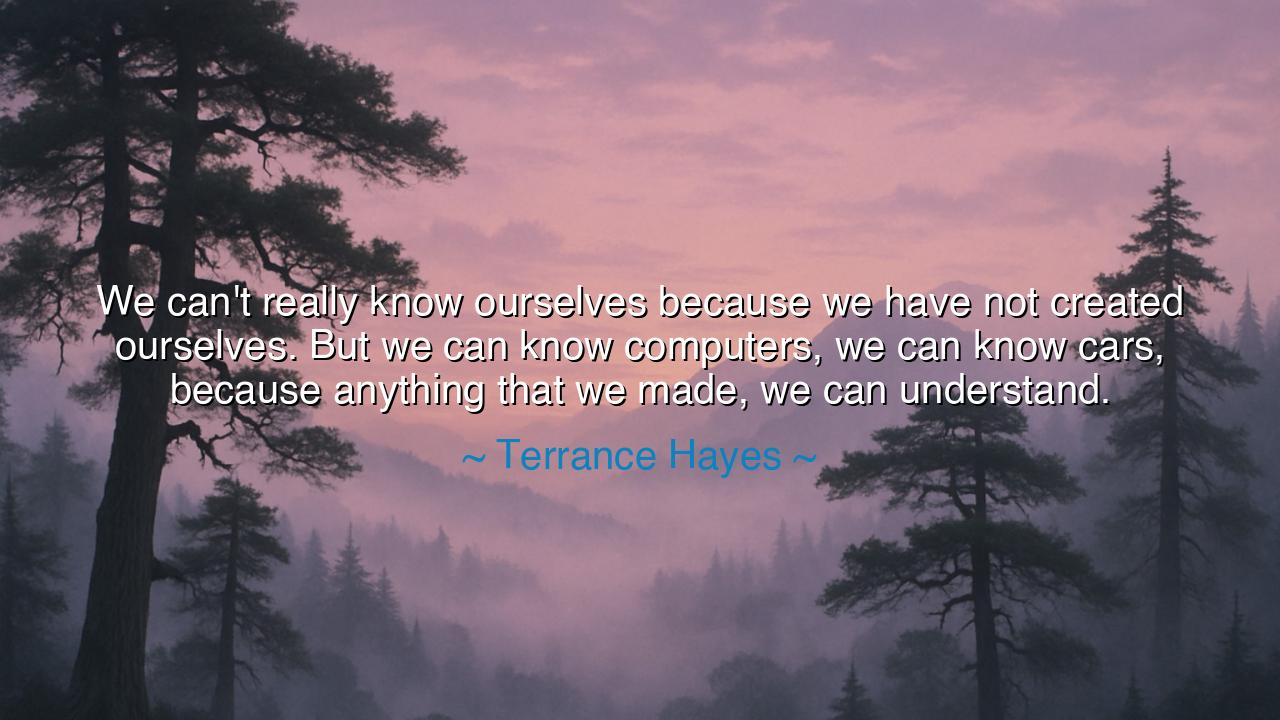
We can't really know ourselves because we have not created
We can't really know ourselves because we have not created ourselves. But we can know computers, we can know cars, because anything that we made, we can understand.






In the contemplative words of Terrance Hayes, poet and philosopher of the human condition, we encounter a truth as mysterious as it is humbling: “We can’t really know ourselves because we have not created ourselves. But we can know computers, we can know cars, because anything that we made, we can understand.” In this simple contrast between man and machine, Hayes unveils the ancient paradox of existence — that the deepest mystery of all lies not in the stars, nor in the inventions of our hands, but within the very being of the one who asks the question. For man, who can take apart an engine, split the atom, and decode the genome, still stands bewildered before his own soul.
From the dawn of thought, the wise have sought to know themselves. The words “Know thyself”, carved upon the stones of Delphi, were not a riddle to amuse the curious, but a lifelong command to those who dared to seek truth. Yet, as Hayes reminds us, self-knowledge is no easy conquest. We are not architects of our essence; we are its inheritors. We did not design the beating of our hearts nor the hungers of our spirit. We awaken within ourselves like strangers in a vast and beautiful land, knowing how to map the heavens yet unable to chart the full landscape of our own minds. To know what we build is to hold mastery; to know ourselves is to confront mystery.
When Hayes says we can know computers and cars, he speaks of the comfort of control — for that which is made by human hands bears the mark of human logic. Every wire, every bolt, every circuit follows a pattern conceived in the mind of its maker. And so, when the machine falters, we can open it, trace its failure, and restore it. But when the heart falters, when the soul trembles or the mind grows heavy with unseen grief, we find no blueprint to consult, no manual to fix what breaks within. The human being, in all his brilliance, remains the one thing he cannot fully explain.
Consider the story of Leonardo da Vinci, who sought throughout his life to understand both the world and himself. He studied the flight of birds, the flow of water, the anatomy of man — he dissected the body in pursuit of the divine logic hidden within it. Yet in his journals, among sketches of machines and muscles, there are words of sorrow and wonder: he could capture the form of the human hand but not the soul that moved it. His genius could measure the symmetry of creation, but not the mystery of his own longing. Like Terrance Hayes, Leonardo glimpsed the eternal truth — that man’s greatest creation is knowledge, and his greatest ignorance, himself.
This truth is both humbling and liberating. To know that we cannot fully know ourselves is to accept that we are more than logic, more than construction. We are not machines of flesh but living mysteries, made of dreams, fears, and divine echoes. While a car runs on fuel and a computer on code, the human being runs on wonder — and wonder cannot be dissected. Hayes’ words call us to revere this mystery, not as a failure of intellect but as a sign of transcendence. For the fact that we did not create ourselves means we are the creations of something greater — nature, the cosmos, or perhaps the divine mind itself.
Yet, his statement also carries a warning: do not confuse mastery over tools with mastery over life. The more we understand our machines, the more we risk forgetting our souls. We fix what we make, but we must learn to tend what we are. Just as a craftsman must sharpen his tools, so must a person cultivate reflection, humility, and care. The mind must be examined, the heart tended, the soul nourished — not through analysis alone, but through silence, prayer, art, and love. These are not sciences of control, but arts of surrender.
Let this be the lesson, then, passed down through time: the self is not a puzzle to be solved, but a mystery to be lived. Do not seek to dissect yourself as you would a machine, for you were not built — you were born. Instead, seek to listen to the voice within, to live with curiosity and grace toward the unknown parts of your being. For as Terrance Hayes reminds us, our creations reveal our intelligence, but our inability to fully know ourselves reveals our depth. In that mystery lies both our limitation and our glory — that we are not the makers of life, but its marvels, ever unfolding.
And so, O listener, cherish the mystery of your own existence. Understand your tools, but revere your soul. Strive not to master yourself as you would a machine, but to love yourself as one loves the ocean — vast, unpredictable, and alive with unseen depths. For in the end, it is not in our understanding that we find peace, but in our wonder.






AAdministratorAdministrator
Welcome, honored guests. Please leave a comment, we will respond soon